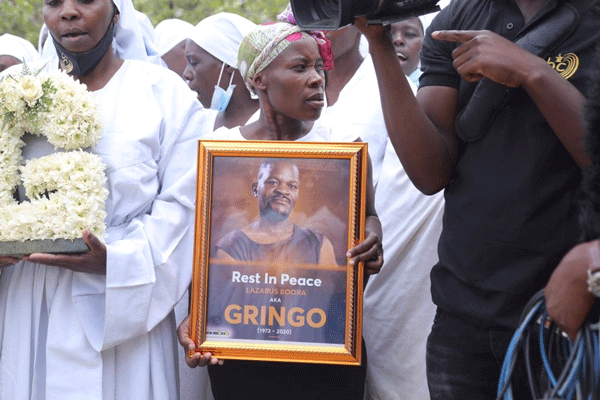
As dark cumulonimbus clouds gather, followed by droplets of rain threatening to turn into a hailstorm, at midday an unrelenting crowd snakes its way through a small bush towards the village cemetery atop a local hill.
By Kennedy Nyavaya
There, a group of actors, among them Wenera star Zolile Makeleni — known to many as Tsotsi — breaks into the famed funeral song as a group of Johane Masowe apostolic sect members arrive bearing a coffin:
“Maria na Maritha… vakataura naIshe… dai magara pano Lazaro haaifa…” they sing repeatedly.
These were the last moments before famed yesteryear comedian Lazarus Boora, aka Gringo, was laid to rest a stone’s throw away from his rural home in Rukweza, some 10km from Nyazura, earlier this month.
Gringo, who was 47, breathed his last on November 9 at a Harare private hospital before burial three days later after a long battle with stomach cancer, leaving behind a wife and seven children.
Artistes, fans, government officials and members of his church were present to pay their last respects at his homestead.
The packed crowd and a fleet of cars parked on either side of the dusty side road turned what could have been another quiet day in the village into a fiesta mood, a situation that spoke volumes of the influence that the funnyman carried throughout his lifetime.
- Chamisa under fire over US$120K donation
- Mavhunga puts DeMbare into Chibuku quarterfinals
- Pension funds bet on Cabora Bassa oilfields
- Councils defy govt fire tender directive
Keep Reading
It might take long before Rukweza produces such an influential individual in the future or play host to a colossal and diverse gathering again. Had they envisaged the impact one of their own had, they would have accorded him more respect and valued the treasure that his talent was.
But, that is not a blemish the rural community should solely carry.
The entire nation, particularly those who enjoyed Gringo’s brilliant acting at the turn of the millennium when he dazzled the small screen through Enock Chihombori’s Gringo series among other film projects, should have felt ashamed that he died with nothing much to show for it financially.
As talented as he was, Gringo could not manage the city life he portrayed in his last days and had to move to his rural home as a cost-cutting mechanism.
His financial coffers could not pay for the very bed he died on, even the coffin or burial costs incurred during the massive funeral wake.
Had it not been for well-wishers including Nyaradzo Funeral Services boss Phillip Mataranyika, his doctor Johannes Marisa and Arts deputy minister Tino Machakaire, who fed mourners and covered most of the bills, it could have been a painful send-off for the TV star.
Although their assistance could also have been too late as it could not resuscitate the corpse, however, all of it was not an entirely new script because when artistes die in Zimbabwe, it is highly likely that a begging bowl will be extended almost immediately afterwards.
Donations and GoFundMe(s) have become an immediate natural response when the angel of death visits most career artistes, exposing a crisis in the industry. How all of Gringo’s fame and perceived success could not manage to secure a decent funeral or, better still, early cancer treatment are questions that should make artistes or anyone who cares about them cringe.
“In Zimbabwe the arts industry is fame that does not fill the stomach, you can be very popular without anything to show for it,” Gringo’s long-time friend and colleague Mbudziyadhura [real name Blessing Chimhowa] told Standard Style at the funeral.
“They say artistes are not organised when it comes to finances, but make an inquiry into the remunerations and you would be shocked that most actors are doing work for nothing.”
Even the late Gringo had hinted, a few days before meeting his fate, that all his efforts in the industry had not rewarded him as anticipated. If anything, his last days were living hell according to his doctor Marisa.
Marisa, whose association — Medical and Dental Private Practitioners of Zimbabwe Association (MDPPZA) — treated Gringo for free until he died, said most of the high-profile mourners and partly ordinary fans had been deceitful in giving him a send-off of that magnitude when they could have also helped him stay alive.
“The man was lying in a one-roomed house where he had no food, nothing, he was not communicating but all these people are hijacking everything,” Marisa said. “This man was suffering, I do not like attention-seekers, I am surprised people were rushing to Kapfupi when he entered, he only came to see him once before he died, but he is coming today to seek attention, pretending to faint.”
Marisa revealed that the stomach ailment could have been treated earlier, but without similar benevolence accorded by MDPPZA, can the bulk of local artistes even afford medical aid?
In a recent interview, National Arts Council of Zimbabwe (NACZ) director Nicholas Moyo underscored that most of their members were struggling to put food on the table, hence they could not afford some of the basics like funeral policies.
“The high cost of living for other professionals has also affected artistes who also do not get money all the time because of the nature of their work and because of that we also cannot organise schemes to help our artistes cover essentials like health and funeral policies,” said Moyo.
“We used to have a funeral policy scheme back in the day, but the take up was low so it failed.”
Moyo’s contributions answer some of the often ignored questions including: Who should secure the welfare of artistes, considering that they work their hearts out to produce the work that entertains various audiences?
CONTINUED TO PAGE S6











